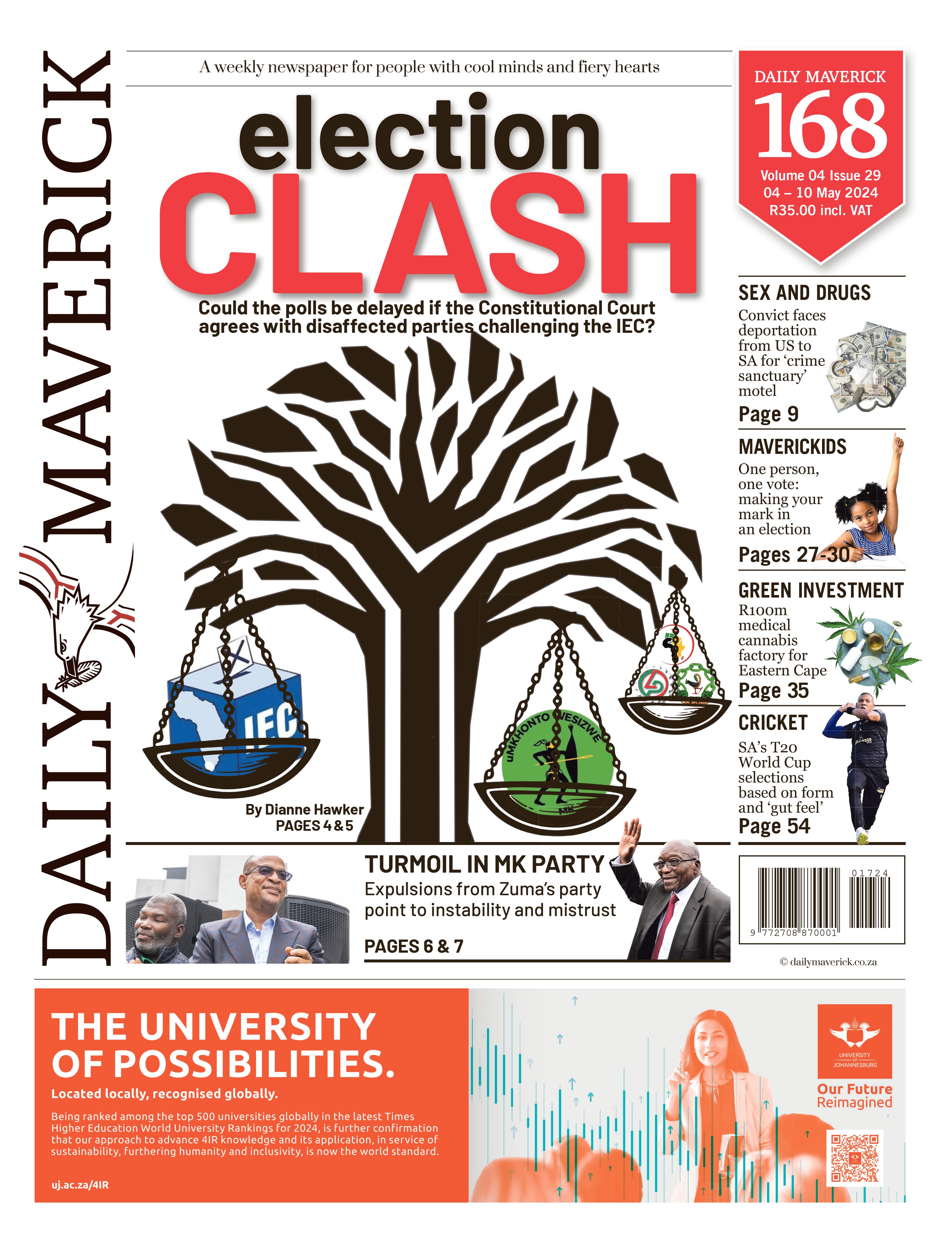One Thanasagren Moodley pulled in something like 1,500 signatures to make the cut for inclusion on the provincial legislature list as the only independent candidate.
With the current debacles in Jacob Zuma’s MK party, the Electoral Commission of South Africa has conceded that it has not verified the authenticity of signatures supporting parties or independent candidates.
Moodley has slipped in whether by sheer weight of his self-proclaimed popularity or by sleight of hand.
He styles himself as “Karou Charou”, which in the parlance of Durban’s historically Indian townships translates to something close to “spicy Indian”. It’s language that is quite acceptable inside Indian-origin communities but can be considered racially offensive when used by someone from outside the fold.
The original “Karou Charou” brand belongs to a Durban spice merchant with a popular line of pickled vegetables and fruit. It’s not known if that small business owner has the means to object to being ripped off.
Nevertheless, Moodley has made a career out of the shock value of his limited vocabulary – he punctuates every second sentence with a swear word. He makes daily posts on Facebook extolling his virtues as a “champion for charous”.
He has tapped into the marginalisation felt by a discernible number in the Indian community, but it’s hardly likely that anyone believes that he can be a voice even in the political wilderness of KwaZulu-Natal.
In a Google search, Moodley comes up second only to Zuma in court appearances for alleged misdemeanours, including bad debt. To his credit, he represents himself rather than hiring counsel at state expense.
A smattering of others have failed in ambitious ploys to present themselves as leaders in the Indian community.
Read more in Daily Maverick: 2024 elections
A rumour doing the rounds is that a shadowy extremist Hindu formation with a prominent presence on seditious WhatsApp groups failed to get even half the signatures necessary to become a political player. A joke from the farcical Indian House of Delegates days was that one candidate polled just one vote, most likely himself, as he could not even inspire the confidence of his wife.
One hazards that Moodley might have better luck in a place where the DA values the Indian and coloured communities only as voting fodder and where the ANC sees their value only as a donor base. Strange how a community in which passions were roused in every household in the anticolonial and anti-apartheid struggles is so switched off by the ANC that the party’s only presence in Indian neighbourhoods is gargantuan posters.
Moodley is on the thinnest ballot paper of 12 independents. Eleven, if one takes account of the candidate standing in both Limpopo and Gauteng, but a significant group nevertheless in changing the political landscape. Save for social and health activist Zackie Achmat, none of the independents has any chance of being elected, but stranger things have happened in politics.
The inclusion of the independents is a step towards enhancing political plurality and representation. The move follows a series of legal battles and societal demands, leading to a landmark decision by the Constitutional Court to overturn previous restrictions on independent candidacy.
The electoral arena is now opened up, offering voters choices beyond the traditional parties. Independents offer voters a glimmer of a direct connection to their representatives, untethered by party discipline.
The independents potentially challenge the traditional notions of party politics. Newbies like Moodley are flummoxed when asked about a manifesto, but that is forgiveable in a country where manifestos are just castles in the air.
Independents face significant challenges. Notably, the absence of party machinery may limit their access to media coverage and grassroots mobilisation and funding.
Achmat has meticulously disclosed that he has raised R5.8-million, mostly small donations from ordinary people, in the mould of Barack Obama’s first presidential campaign. The rest are largely self-funded. Moodley appears to be backed by burger joints and motor parts dealers.
However, the mere presence of independent candidates injects vitality and diversity into the electoral process. It represents a milestone in South Africa’s 30-year democratic journey, not to mention a dash of laughs. DM
This story first appeared in our weekly Daily Maverick 168 newspaper, which is available countrywide for R35.

















From the ‘acclaimed paradise’ (self declared?) of the western cape … it would seem that if KZN bound Moodley resurrected the Rajbansi ‘label/brand’ .. like the film ‘sequels’ part II or III … he would have a better chance of actually winning some votes ? Quite remarkable how in this day and age .. some people still respond to the lure of “charou” ‘identity’ (or any other identity) politics . Thank goodness .. at least Zackie is way above that! Thanks for ‘spicy’ observations.
This is really malicious journalism saying the DA only uses Indian and Coloured communities as voting fodder. Indefencible
It’s clearly labelled as an opinion piece by a guest author, not journalism. It’s closer to “Letters to the Editor”.